 Petzlover
Petzlover Belgian Shepherd Dog (Malinois) is originated from Belgium but Lakeland Terrier is originated from United Kingdom. Belgian Shepherd Dog (Malinois) may grow 28 cm / 12 inches higher than Lakeland Terrier. Belgian Shepherd Dog (Malinois) may weigh 26 kg / 58 pounds more than Lakeland Terrier. Both Belgian Shepherd Dog (Malinois) and Lakeland Terrier has almost same life span. Belgian Shepherd Dog (Malinois) may have more litter size than Lakeland Terrier. Belgian Shepherd Dog (Malinois) requires Low Maintenance. But Lakeland Terrier requires Moderate Maintenance
Belgian Shepherd Dog (Malinois) is originated from Belgium but Lakeland Terrier is originated from United Kingdom. Belgian Shepherd Dog (Malinois) may grow 28 cm / 12 inches higher than Lakeland Terrier. Belgian Shepherd Dog (Malinois) may weigh 26 kg / 58 pounds more than Lakeland Terrier. Both Belgian Shepherd Dog (Malinois) and Lakeland Terrier has almost same life span. Belgian Shepherd Dog (Malinois) may have more litter size than Lakeland Terrier. Belgian Shepherd Dog (Malinois) requires Low Maintenance. But Lakeland Terrier requires Moderate Maintenance
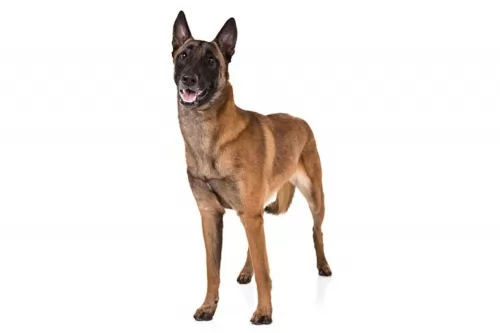 The Belgian Malinois is one of 4 Belgian Shepherd varieties. The dogs were developed- and hail from Belguim. The Malinois has a short, fawn colored coat. The American Kennel Club recognizes that the Malinois is a separate breed from the other 3 varieties. It was in 1892 that Professor Reul wrote the first Belgian Shepherd Dog standard, recognizing 3 varieties – dogs with short coats, dogs with long coats and dogs with rough coats.
The Belgian Malinois is one of 4 Belgian Shepherd varieties. The dogs were developed- and hail from Belguim. The Malinois has a short, fawn colored coat. The American Kennel Club recognizes that the Malinois is a separate breed from the other 3 varieties. It was in 1892 that Professor Reul wrote the first Belgian Shepherd Dog standard, recognizing 3 varieties – dogs with short coats, dogs with long coats and dogs with rough coats.
Today's Malinois goes back to a breeding pair owned by Adrien Janssens. It was in 1885 that he bought a fawn, rough-haired dog, breeding the dog with a short-haired dog named Lise de Laeken. After other breedings, the two dogs were recognized as ancestors of the modern Belgian Shepherd Dogs.
The city of Malines formed a club for the promotion of these fawn short hairs and the name Malinois became synonymous with them. In March 1992, the American Belgian Malinois Club received AKC parent club status.
 The Lakeland Terrier hails from the lake district of England. They were bred to hunt foxes that were coming after the lambs during lambing season.
The Lakeland Terrier hails from the lake district of England. They were bred to hunt foxes that were coming after the lambs during lambing season.
These dogs are connected to a number of terrier breeds such as the Bedlington-, Border-, Old English Black and Tan- as well as the Dandie Dinmont Terriers.
In 1921 the Lakeland Terrier Association was formed and the American Kennel Club registered a Lakeland in 1934.
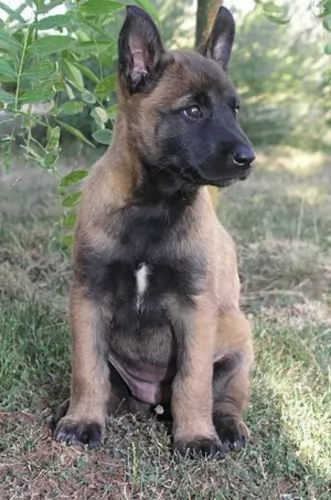 The Malinois is a medium-size Belgian shepherd dog. People sometimes mistake them for the German Shepherd as they are fairly similar to look at. The Malinois however is a smaller, lighter boned dog with naturally upright ears and a black-masked face. He is shorthaired and fawn-colored with black tips on the hairs, although other colors are brown or red too. He is an intelligent and active dog, always having been used for herding-, police- and rescue work.
The Malinois is a medium-size Belgian shepherd dog. People sometimes mistake them for the German Shepherd as they are fairly similar to look at. The Malinois however is a smaller, lighter boned dog with naturally upright ears and a black-masked face. He is shorthaired and fawn-colored with black tips on the hairs, although other colors are brown or red too. He is an intelligent and active dog, always having been used for herding-, police- and rescue work.
You’ll find the Malinois somewhat unpredictable as some are friendly and confident while other can be shy and withdrawn around strangers. This is a dog who loves to be around his human family, but to bring out the best in him, training and socialization classes will be necessary. Well-socialized Malinois are always good with children and other pets, more so if they’ve been raised with them.
 The Lakeland Terrier is a small to medium-sized dog which stands at between 33 – 38cm at the withers and weighs between 7 – 8kg.
The Lakeland Terrier is a small to medium-sized dog which stands at between 33 – 38cm at the withers and weighs between 7 – 8kg.
The head is rectangular and he has semi-erect, semi-floppy ears and a docked tail which is held up. These days you’ll find the Lakeland being left with a long tail, taking away that attractive, square, compact look. The crisp double coat can come in a number of colors such as tan, grizzle, black and tan together, a wheatish color with some red and white. The coat is regarded as being hypoallergenic.
Possessing a number of positive attributes, Lakies, a nickname of these jaunty little dogs, is a friendly, loving, bold, self-confident dog. You’ll find that he is also determined and strong-willed but training and socialization turns him into a more obedient dog. He then gets on well with everyone in the household as well as with other pets.
They are intelligent dogs, so it won’t be difficult training him when proper training methods are used.
He is adaptable too and will adapt to life in the city or in the countryside, so long as he is exercised regularly as they are excitable, energetic dogs.
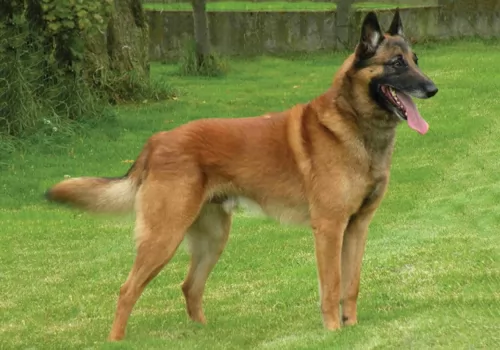 The Belgian Malinois makes a wonderful guard dog and he works hard to ensure that his human family, whom he adores, are well protected under his watch. They’re such intelligent dogs too that you may feel inclined to pass over some of your chores to him.
The Belgian Malinois makes a wonderful guard dog and he works hard to ensure that his human family, whom he adores, are well protected under his watch. They’re such intelligent dogs too that you may feel inclined to pass over some of your chores to him.
He responds well to training, and to get the best from this breed, start with training and socialization as soon as you bring your puppy home.
Socialization is excellent as it introduces your puppy to different people, animals as well as situations.
He is an adaptable dog and can live in an apartment if he is well exercised. He can be your devoted and loyal friend for a good number of years but you will have to do your part in providing him with the best care possible.
 It doesn’t matter that the Lakeland Terrier was bred to hunt and kill foxes in the Lake District of England because he is more than willing to settle down and become a loving and devoted pet too.
It doesn’t matter that the Lakeland Terrier was bred to hunt and kill foxes in the Lake District of England because he is more than willing to settle down and become a loving and devoted pet too.
He is a robust dog, known for his determination and courage. He is an energetic dog too so when you bring him into your home, be prepared to up your activity levels to cater for your energetic friend.
You can add good health to his list of positive attributes. He is a healthy dog breed with few health complaints to write about. Treat him well as every dog deserves and you can have him around for about 15, 16 or 17 years.
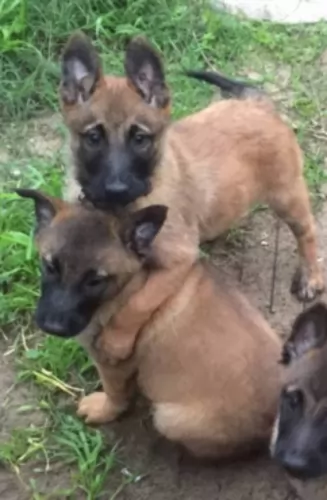 Belgian Malinois are generally healthy dogs. However every dog, regardless of breed, can pick up illnesses, and it is always wise to be aware of some of the diseases your Malinois might face.
Belgian Malinois are generally healthy dogs. However every dog, regardless of breed, can pick up illnesses, and it is always wise to be aware of some of the diseases your Malinois might face.
An inherited condition where the thigh bone doesn't fit properly into the hip joint. As the dog ages, arthritis can develop.
A degenerative eye disorder that can lead to blindness.
Brush his teeth at least 2 or 3 times a week to remove tartar build-up. Too much plague leads to inflamed gums, bad breath, pus inside the mouth and even loss of teeth.
 The truth about any dog is that good nutrition, exercise and lots of love can contribute to ensuring a long, healthy life for your pet.
The truth about any dog is that good nutrition, exercise and lots of love can contribute to ensuring a long, healthy life for your pet.
Some health problems are inherited while others can be prevented simply by the kind of home you provide your pet with. Once you decide to bring a dog into your home, you need to do everything you can to ensure his wellbeing.
This is a joint problem which can see your pet limping or moving along in a skipping manner. You will need to see the vet because sometimes friction can lead to osteoarthritis, pain and lameness.
Eye problems such as cataracts and glaucoma can lead to blindness.
Terrier dogs are prone to allergies and dry, itchy skin can lead to other problems such as bacterial infections and be frustrating and stressful for your pet.
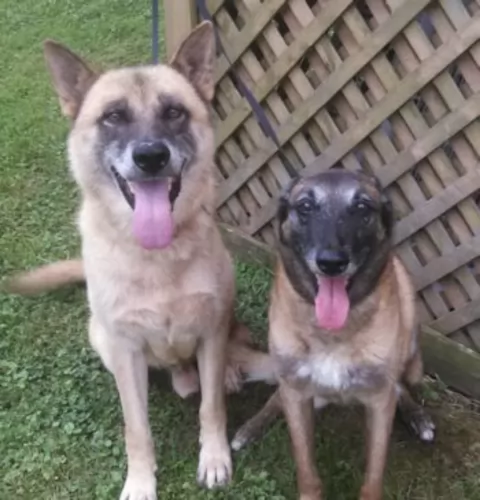 Because the Malinois is a constant shedder, with a couple of heavy shedding periods during the year, you’ll need to be conscientious with his grooming and brush him at least twice a week to get rid of loose hairs and to give his thick coat a glossy, healthy look to it.
Because the Malinois is a constant shedder, with a couple of heavy shedding periods during the year, you’ll need to be conscientious with his grooming and brush him at least twice a week to get rid of loose hairs and to give his thick coat a glossy, healthy look to it.
Because of their high energy, Malinois aren’t recommended for couch-potato type owners. It will be cruel to buy such a dog and to leave him to waste away with boredom and frustration in your back yard. He’ll want lots of rough and tumble, ball games, runs in the park or in the country and long walks.
Belgian Shepherd Malinois puppies are vulnerable when they’re tiny, and it would be wise to speak to your vet about superb nutrition to build up a puppy’s immune system.
An excellent way to ensure the health of your growing Malinois is to give him a home prepared meals along with commercially manufactured food recommended by your vet. You can’t just put a bowl of commercially manufactured dog food in front of him day after day month after month.
Apart from what your vet recommends, give him some brown rice, some cooked vegetables and some raw meat. Raw meat will ensure he can fight of skin infections. The age of the dog, emotional state and environmental influences can all play a role in skin diseases with dogs, but by ensuring some raw meat in his diet, the immune system is strengthened and skin disorders are eliminated. Always ensure a steady supply of fresh water.
 Grooming doesn’t only keep your 4-legged friend in tip top shape in terms of looking well cared for, it makes him feel good too and it contributes to his wellbeing.
Grooming doesn’t only keep your 4-legged friend in tip top shape in terms of looking well cared for, it makes him feel good too and it contributes to his wellbeing.
Regular grooming also decreases the chance of health problems because you can simultaneously check him for lumps, scratches, parasites and allergies.
Stripping is a technique where you pull the dead hair out of the coat by either using your fingers or a stripping knife. This stripping makes makes room for a new coat to grow.
It is a good and effective grooming method for Terrier type dogs, and the best part about it is that if it is done correctly, the process is painless.
Other Terrier owners have a professional groomer clip the coat. In between these grooming procedures, brush your Lakie twice a week to keep the coat soft, springy and shiny.
Other grooming needs for your Lakeland include trimming his nails as needed, checking the inside of his ears for dirt and too much wax and brushing his teeth twice a week to keep tartar and bacteria at bay.
If you’re a responsible dog owner and you are unsure how to do these grooming procedures, there is no need to fret as there are always professional groomers and dental cleaning procedures that your vet will recommend. These experts can do the job professionally and painlessly for your pet.
Nothing is set in stone about what your Lakeland Terrier should eat, but it is a known fact that high quality, nutritious food wards off illness and increases longevity.
How much your adult dog eats will depend on his age and his activity levels. You want to ensure he gets the right proportions to avoid obesity too. The female Lakeland will give you 3 – 4 puppies and during this time you want to ensure she’s getting the very best, nutritious food there is – after all it’s for the sake of her puppies.
The truth about any dog is that good nutrition, exercise and lots of love can contribute to ensuring a long, healthy life for your pet. Some health problems are inherited while others can be prevented simply by the kind of home you provide your pet with.
Once you decide to bring a dog into your home, you need to do everything you can to ensure his well-being.